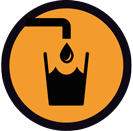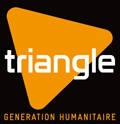AREA OF EXPERTISE

Water, hygiene and sanitation

AREA OF EXPERTISE

Water, hygiene and sanitation
FUNDING
The previous projects operated by TGH enabled the rehabilitation of a great part of that network. However, the District 1 still has no access to drinking water. Besides, by increasing the quantity of available water we also increase the quantity of liquid waste to be evacuated and treated. The actions undertaken within the frame of this project thus focus on these two indissociable aspects: drinking water and sanitation.
The town of Munchon is located on the eastern coast of North Korea and has 42,500 inhabitants. In the 1960s, the government built a public water system. However, owing to lack of maintenance and means, the system became totally obsolete and had multiple breakdowns. Previous projects run by TGH led to rehabilitation of a major portion of the water system. However, one the town’s four districts still lacks access to potable water.
In addition, by increasing the quantity of available water, one automatically increases the amount of sewage to evacuate and treat. Therefore this project covers two inseparable aspects: potable water and sanitation.
The aim is to reduce mortality and waterborne diseases (particularly among vulnerable people) and improve access to drinking water and sanitation services. We will achieve this by improving the general sanitary environment of the town (rehabilitation and construction of latrines, improvement of waste water evacuation), increasing the quantity of available drinking water and by training the North Korean actors to maintain the networks, build new units and respect good practices in terms of hygiene and sanitation.
During this first phase of the project (launched early 2010), we have mainly focused on designing and laying the hydraulic and sanitation installations, and training the Korean people involved in the implementation, follow-up and future maintenance of the system.
We are currently installing the potable water network’s large-end diameter conduits (over 300 mm). These pipes, that are thermosealed together, are buried fifty centimeters underground to avoid risk of freezing and to protect them against potential degradation. In total, over 7 kilometers of piping will be laid during this project, providing potable water to 13,000 people.
Together with the access to water activities, TGH is preparing the creation of decentralized units for treatment of sewage. These units will allow organic degradation of sewage pollution before outfall in the natural environment. Easy to implement and operate, they also have the advantage of operating without power. TGH will also rehabilitate 2000 meters of wastewater disposal pipes, thus considerably reducing contamination and disease risks. The treatment units will be connected to this network, enabling wastewater disposal directly in the sea.
Construction of public latrines will also begin soon, the design period having been completed. In total, TGH will build twenty latrine blocks, with eight cabins per block.
To optimize the impact of this project, we will organize water-related hygiene awareness and good practices sessions for the public throughout the project.
Technicians from Munchon city have already been trained and training will continue all through the project to cover the various operations involved in this kind of infrastructure and to enable the technicians to carry out preventative and curative maintenance.
At the end of this project, the North Korean technicians will be autonomous regarding these works, which assures the system’s continuity.